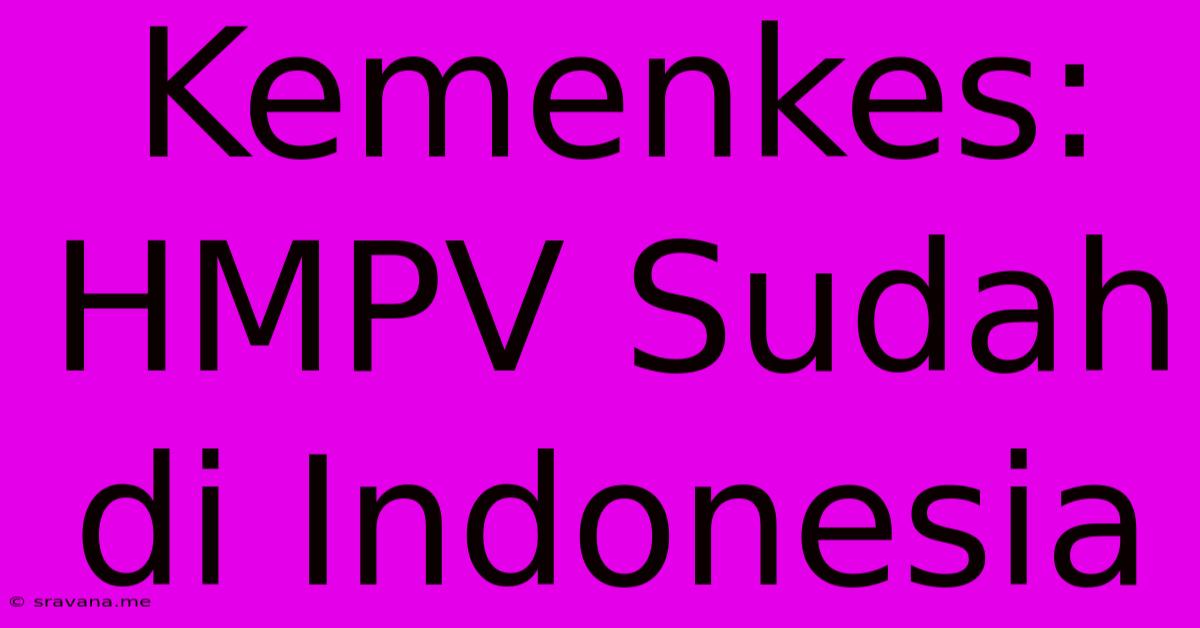Kemenkes: HMPV Sudah Di Indonesia

Discover more detailed and exciting information on our website. Click the link below to start your adventure: Visit Best Website sravana.me. Don't miss out!
Table of Contents
Kemenkes: HMPV Sudah di Indonesia – Waspada terhadap Virus Baru Ini!
Indonesia's Ministry of Health (Kemenkes) has confirmed the presence of Human Metapneumovirus (HMPV) within the country. This announcement necessitates a heightened awareness and understanding of this relatively new respiratory virus, its symptoms, transmission, and preventative measures. While not as widely known as influenza or RSV, HMPV poses a significant threat, particularly to vulnerable populations. This article aims to provide comprehensive information regarding HMPV in Indonesia, directly addressing the Kemenkes announcement and offering practical guidance for individuals and families.
Understanding Human Metapneumovirus (HMPV)
HMPV is a common respiratory virus that can cause mild to severe respiratory illnesses. It belongs to the family Paramyxoviridae, similar to RSV (Respiratory Syncytial Virus) and measles. While often causing mild cold-like symptoms, HMPV can lead to more serious complications, especially in young children, the elderly, and individuals with underlying health conditions.
Symptoms of HMPV Infection
Symptoms of HMPV infection are similar to those of other respiratory viruses and can vary in severity. Common symptoms include:
- Runny nose: Often a prominent early symptom.
- Cough: Can range from mild to severe.
- Fever: May be present, particularly in younger children.
- Sore throat: A common complaint.
- Headache: Another frequent symptom.
- Muscle aches: Especially in adults.
- Shortness of breath: A more serious symptom indicating potential pneumonia.
- Wheezing: Indicative of bronchiolitis or other lower respiratory tract infections.
Severe cases, especially in high-risk groups, might present with:
- Pneumonia: Inflammation of the lungs.
- Bronchiolitis: Inflammation of the small airways in the lungs.
- Croup: Inflammation of the larynx, trachea, and bronchi.
Transmission of HMPV
HMPV is primarily transmitted through respiratory droplets produced when an infected person coughs or sneezes. These droplets can be inhaled by others in close proximity, leading to infection. Similar to other respiratory viruses, HMPV can also spread through contact with contaminated surfaces. Touching a surface with the virus and then touching your face, particularly your eyes, nose, or mouth, can lead to infection.
Kemenkes' Response and Public Health Measures
The Kemenkes announcement regarding the presence of HMPV in Indonesia underscores the importance of proactive public health measures. The ministry is likely implementing strategies to:
- Increase surveillance: Monitoring the spread and severity of HMPV infections across the country.
- Enhance diagnostics: Improving access to testing to accurately identify HMPV cases.
- Public awareness campaigns: Educating the public about HMPV, its symptoms, and preventative measures.
- Healthcare system preparedness: Ensuring hospitals and healthcare facilities are equipped to manage HMPV cases, especially those requiring hospitalization.
Protecting Yourself and Your Family from HMPV
While there is no specific vaccine for HMPV, several measures can significantly reduce your risk of infection:
- Practice good hygiene: Frequent and thorough handwashing with soap and water is crucial. Use hand sanitizer when soap and water are not available.
- Avoid close contact with sick individuals: Maintain a safe distance from anyone exhibiting respiratory symptoms.
- Cover your coughs and sneezes: Use a tissue or your elbow to cover your mouth and nose when coughing or sneezing. Dispose of used tissues properly.
- Stay home when sick: Avoid going to work, school, or other public places if you are feeling unwell.
- Clean and disinfect frequently touched surfaces: Regularly clean and disinfect surfaces such as doorknobs, countertops, and light switches.
- Get vaccinated against other respiratory viruses: Staying up-to-date on influenza and other relevant vaccinations can help strengthen your overall immune system.
- Strengthen your immune system: Ensure adequate rest, a balanced diet, and regular exercise to boost your body's natural defenses.
For high-risk individuals: Close monitoring and prompt medical attention are crucial. Consult your doctor immediately if you experience severe respiratory symptoms or if you have underlying health conditions that make you more vulnerable to respiratory infections.
The Importance of Early Diagnosis and Treatment
Early diagnosis is key to effective management of HMPV infection. If you suspect you or a loved one has HMPV, consult a doctor for proper diagnosis and treatment. Treatment typically focuses on managing symptoms, such as fever and cough, and providing supportive care. In severe cases, hospitalization might be necessary to provide respiratory support and prevent complications.
Conclusion: Staying Informed and Proactive
The Kemenkes announcement serves as a crucial reminder of the ongoing need for vigilance against emerging respiratory viruses. While HMPV might not be as widely discussed as influenza, its potential for serious illness, particularly in vulnerable populations, warrants attention. By understanding the virus, its transmission, and preventative measures, we can collectively work to minimize its impact on public health in Indonesia. Staying informed through official channels like the Kemenkes website and practicing good hygiene are essential steps in protecting ourselves and our communities. Remember, prevention is the best medicine. Staying proactive and informed is the best way to safeguard your health and the health of your loved ones.

Thank you for visiting our website wich cover about Kemenkes: HMPV Sudah Di Indonesia. We hope the information provided has been useful to you. Feel free to contact us if you have any questions or need further assistance. See you next time and dont miss to bookmark.
Also read the following articles
| Article Title | Date |
|---|---|
| Westwoods Sales And Profits Climb | Jan 14, 2025 |
| Monday Morning Flood Update January 6th | Jan 14, 2025 |
| Zoom Inroads Into Microsofts Market | Jan 14, 2025 |
| Gerrard Welcomes Irish Grandchild News | Jan 14, 2025 |
| Gerrard Warned Over Recent Party | Jan 14, 2025 |
